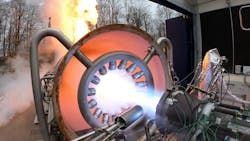LUMEN is ready for industrial innovations in spaceflight
COLOGNE, Germany - A rocket engine consists of many individual components that are subject to enormous stresses. To ensure that what belongs together works together during use, it is not enough to develop and test the individual components. Rather, it requires an understanding of the overall interaction of the components. This is the goal of the Liquid Upper Stage Demonstrator Engine (LUMEN) project at the German Aerospace Center (Deutsches Zentrum für Luft- und Raumfahrt; DLR). The DLR team has now successfully commissioned the LUMEN demonstrator, which was developed in-house. LUMEN is a pumped liquid oxygen (LOX) and methane engine; it was hot fired on the European Research and Technology Test Bench P8.3 at the DLR site in Lampoldshausen, writes the German Aerospace Center (DLR). Continue reading original article.
The Military & Aerospace Electronics take:
4 April 2024 -"LUMEN enables us to validate technologies that can only be tested in a complete rocket engine. This is unique in Europe and not only strengthens our research expertise but also opens up far-reaching application possibilities for industrial companies and start-ups," explains Project Manager Tobias Traudt from the DLR Institute of Space Propulsion.
"With the LUMEN demonstrator, we can now investigate the interaction of individual engine components very precisely, quickly and cost-effectively," says Tobias Traudt, summarising the successes of the project. In addition, the DLR writes, "as a test system, LUMEN will also offer interested parties from research institutions and the aerospace industry the opportunity to test components or technologies in a real environment for rocket engines in order to achieve a rapid transfer to industrial applications."
Related: Deutsche Aircraft delivers D328TM to German Aerospace Center as next flying test lab
Related: The German Aerospace Center (DLR) researches flexible wing surfaces
Jamie Whitney, Senior Editor
Military + Aerospace Electronics
